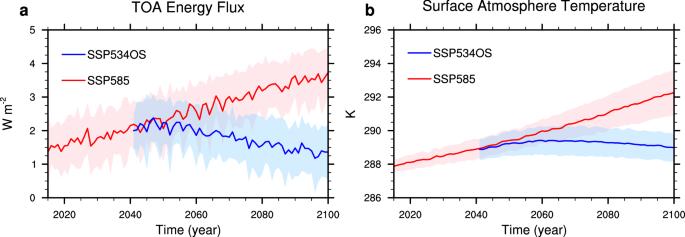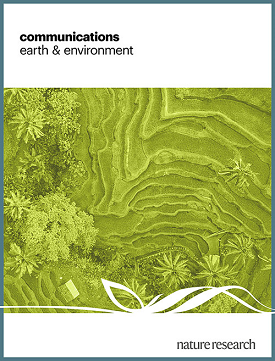Mitigation-driven global heat imbalance in the late 21st century
IF 8.1
1区 地球科学
Q1 ENVIRONMENTAL SCIENCES
引用次数: 0
Abstract
While the changes in ocean heat uptake in a warming climate have been well explored, the changes in response to climate mitigation efforts remain unclear. Using coupled climate model simulations, here we find that in response to a hypothesized reduction of greenhouse gases in the late 21st century, ocean heat uptake would significantly decline in all ocean basins except the North Atlantic, where a persistently weakened Atlantic meridional overturning circulation results in sustained heat uptake. These prolonged circulation anomalies further lead to interbasin heat exchanges, characterized by a sustained heat export from the Atlantic to the Southern Ocean and a portion of heat transfer from the Southern Ocean to the Indo-Pacific. Due to ocean heat uptake decline and interbasin heat export, the Southern Ocean experiences the strongest decline in ocean heat storage therefore emerging as the primary heat exchanger, while heat changes in the Indo-Pacific basin are relatively limited. Climate mitigation efforts will decrease ocean heat uptake in all ocean basins, except the North Atlantic, where weakened Atlantic Meridional Overturning Circulation leads to sustained heat uptake, according to results from climate simulations to analyze changes in global ocean heat due to a projected greenhouse gas reduction.

21 世纪末由减缓驱动的全球热失衡
虽然人们已经对气候变暖时海洋吸热的变化进行了深入探讨,但对气候减缓努力的响应变化仍不清楚。利用耦合气候模型模拟,我们发现在 21 世纪晚期假设温室气体减少的情况下,除北大西洋外,所有大洋盆地的海洋吸热都将显著下降,因为北大西洋持续减弱的大西洋经向翻转环流导致了持续的吸热。这些持续的环流异常进一步导致了流域间的热交换,其特点是大西洋向南大洋持续输出热量,南大洋向印度洋-太平洋转移部分热量。由于海洋吸热的减少和流域间热量的输出,南大洋的海洋热储存量下降最为严重,因此成为主要的热交换器,而印度洋-太平洋海盆的热量变化则相对有限。根据气候模拟结果,分析预计温室气体减少导致的全球海洋热量变化,气候减缓努力将减少所有海洋盆地的海洋吸热,但北大西洋除外,因为北大西洋大西洋经向翻转环流减弱导致持续吸热。
本文章由计算机程序翻译,如有差异,请以英文原文为准。
求助全文
约1分钟内获得全文
求助全文
来源期刊

Communications Earth & Environment
Earth and Planetary Sciences-General Earth and Planetary Sciences
CiteScore
8.60
自引率
2.50%
发文量
269
审稿时长
26 weeks
期刊介绍:
Communications Earth & Environment is an open access journal from Nature Portfolio publishing high-quality research, reviews and commentary in all areas of the Earth, environmental and planetary sciences. Research papers published by the journal represent significant advances that bring new insight to a specialized area in Earth science, planetary science or environmental science.
Communications Earth & Environment has a 2-year impact factor of 7.9 (2022 Journal Citation Reports®). Articles published in the journal in 2022 were downloaded 1,412,858 times. Median time from submission to the first editorial decision is 8 days.
 求助内容:
求助内容: 应助结果提醒方式:
应助结果提醒方式:


